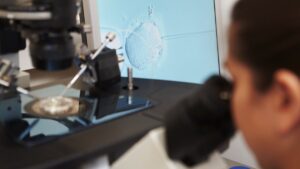Sperm DNA damage can double a pregnant woman's risk of developing preeclampsia after IVF. This is clear from a study conducted by Lund University. Babies are also more at risk of premature birth.
It has long been known that women who become pregnant through assisted reproduction are at increased risk of developing preeclampsia. There are also risks of recurrent miscarriage, premature birth, and low birth weight. The reasons for this have not been fully determined.
Meanwhile, it is also known that 20 to 30 percent of children born with the help of in vitro fertilization have fathers with damaged sperm DNA.
It can still fertilize eggs
Sperm with damaged DNA can fertilize eggs, but their chances are lower than otherwise. If the percentage of sperm DNA damage exceeds 30 percent, the probability of natural fertilization is close to zero.

Assisted fertilization
Assisted fertilization can be done as follows:
- Insemination: The man's sperm is inserted directly into the woman's uterus via a catheter.
- Artificial insemination, or in vitro fertilization: The egg is placed in a container with a larger number of sperm, which then handle the fertilization process themselves.
- ICSI: One sperm is selected and injected directly into the egg.
Artificial insemination is growing strongly in Sweden. In 2021, 5,614 babies were born conceived through artificial insemination.
Source: Lund University
There is a DFI scale, which indicates the percentage of DNA damage in sperm and is used to provide information about male fertility.
Although current test tube technologies mean that men with high DFI can become fathers, knowledge so far is limited about how high DFI affects pregnancies and the health of children. It has been difficult to research, partly because the DFI scale is not included in the standard measurements performed in fertility clinics in Sweden.
Double the risk of disease
In 841 couples who underwent IVF, a DFI measurement of more than 20 percent doubled a pregnant woman's risk of developing preeclampsia, the new study shows. In addition, the risk of premature birth increased.
In the IVF group in which the DFI was less than 20 percent, the risk of preeclampsia was 4.8 percent, which is similar to naturally occurring pregnancies.
For couples who underwent ICSI, see fact box above, no link to preeclampsia was observed.
The damage was not detected
Before artificial insemination, a man's sperm is analyzed. There, sperm concentration, movement and shape are examined. There are men who, according to analyses, have completely normal sperm, but still have a decrease in fertility. Researchers say DFI, an analysis of DNA damage in sperm, should be done routinely in fertility clinics.
– It can give couples answers as to why they are not getting pregnant and can influence the method they choose for assisted conception. In addition, our new results show that the analysis can be used to identify high-risk pregnancies, says Alexander Gyorkman, professor of reproductive medicine at Lund University and chief physician at Scania University Hospital in Malmö.
It can be linked to health
According to researchers, a high rate of damage to sperm DNA is linked to men's general health and can be treated. Most DNA damage is caused by oxidative stress, which means there is an imbalance between harmful molecules and antioxidants that protect cells. Factors that increase DNA damage are smoking, obesity, infections, and increasing age.
The next step is to determine which group of men has the best effect of methods to prevent and treat sperm DNA breaks, as well as to test these methods as a means of preventing pregnancy complications, says Amelie Stenqvist, MD, Lund University physician specializing in obstetrics and gynecology at Scania University Hospital. In Malmö.
Scientific material:
High sperm DNA fragmentation index is associated with an increased risk of preeclampsia after assisted reproductive treatment, Fertility and infertility.





More Stories
The contribution of virtual reality to research in medicine and health
The sun could hit the Internet on Earth
In memory of Jens Jørgen Jørgensen